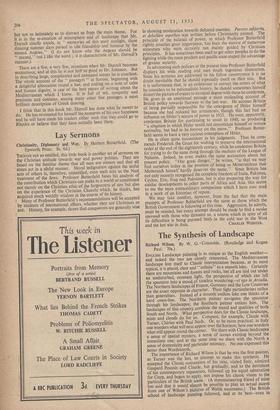Lay Sermons
Christianity, Diplomacy and War. By Herbert Butterfield. (The Epworth Press. 8s. 6d.) THOUGH not so entitled, this little book is another set of sermons on the Christian attitude towards war and power politics. They are based on the familiar theme that all men are sinners and that all ' states act in a sinful manner. Moral indignation against the sinful acts of others is, therefore, unjustified, even such acts as the Nazi treatment of the Jews. Professor Butterfield bases his analysis of the contribution which Christians can make in a world so constituted not merely on the Christian ethic of the forgiveness of sins but also on the experience of the Christian Churchr which, he thinks, has acquired much worldly wisdom in the course of its history. Many of Professor Butterfield's recommendations will be accepted by students of international affairs, whether they are Christians or not. History, for example, shows that conquerors are generally wise in showing moderation towards defeated enemies. Parcere subjectis, et debellare superbos was written before Christianity existed. The principle of the balance of power, to, which Professor Butterfield rightly attaches great importance, has been the motive of numerous statesmen who were certainly not mainly guided by Christian principles. It has sometimes been used to get other peoples to do the fighting while the more prudent and pacific state reaped the advantage of greater security.
In advocating such policies at the present time Professor Butterfield displays his wide reading and uses much ingenious illustration.
Since his sermons are addressed to his fellow countrymen it is no doubt inevitable that he should especially dwell on tffeir sins. But it is unfortunate that, in an endeavour to correct the errors of what he considers to be nationalistic history, he should sometimes himself distort the picture of events to an equal degree with those he condemns. He gives in an emotional passage a most misleading account of British policy towards Norway in the last war. He accuses Britain' of being partially responsible for the emergence of Hitler himself because she had reduced her armaments, though this fact had no influence on Hitler's seizure of power in 1933. He even, apparently, condemns Britain for continuing to resist in 1940, so producing "a situation in which Hitler could not consolidate himself or restore normality, but had to be forever on the move." Professor Butter- field seems to have a very curious conception of Hitler.
He is often quite inconsistent in his judgments. Thus he com- mends Frederick she Great for wishing to preserve the international order at the end of the eighteenth century, while he condemns Britain for trying to do the same thing through the medium' of the League of Nations. Indeed, he even makes the same accusation about her present policy. "Our great danger," he writes, "is that we may find ourselves today in the position of being so Metternichian that Metternich himself hardly deserves the name." Since Britain has not only recently recognised the complete freedom of India, Pakistan, Ceylon, Eire, Iraq and Palestine, but is also preparing the way for similar developments in other parts of Africa and Asia, this seems to me the most extraordinary comparison which I have ever read in a work of an historian of repute.
We may take comfort, however, from the fact that the main precepts of Professor Butterfield are the same as those which the British Government is following at this time. Aggression, he admits, must be resisted, but every attempt should be made to find a modus operandi with those who threaten us, a course which in spite of all its difficulties is being pursued both in the cold war in the West


























 Previous page
Previous page